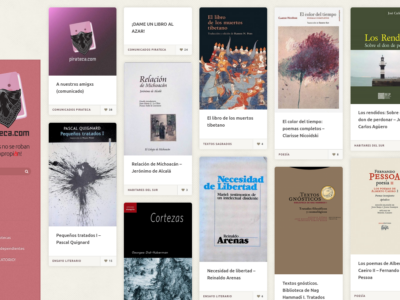Stories about TOPICS from November, 2022
Mexican collective pirating books to make culture accessible is blocked
Since 2019, the Pirateca.com website has provided open access to more than 279 Spanish titles, under the slogan “Books are not stolen, they're expropriated!”
In Turkey, social media platforms become complicit in censoring media and freedom of speech
Twitter, YouTube, TikTok, and Facebook have become complicit in aiding the state to silence independent voices in Turkey, even at times when content is not political.
In Turkey, a football federation joins a list of institutions with powers to censor content online
Granting a football federation rights to censor content in the absence of a court order is yet another sign of a narrowing environment for freedoms.
As we enter an era of Elon Musk's Twitter, is it time for us in civil spaces to find alternatives?
Looking ahead, the rest of us must resume the debate about the enormous power we have bequeathed social media platforms and the overdependence on Twitter by those who work in social justice, governance, human rights, and democracy.
El Salvador’s Pegasus spyware case left uninvestigated ten months later
The use of Pegasus spyware against journalists represents a serious threat to freedom of the press, digital rights, and a key challenge to investigate the configuration of a digital authoritarianism in El Salvador.
Defamation lawsuit against Serbian investigative media outlet KRIK sets a dangerous precedent
Just before Serbian investigative media outlet KRIK received an EU Award for Investigative Journalism, a Serbian court sentenced it for publishing truthful news about a criminal trial.
LIVE on November 24: Disinformation and censorship in Russia
Join us on YouTube live on November 24 for a discussion exploring the convergence of Russia’s rapidly strengthening censorship infrastructure, and its use of disinformation both internally and externally.
TikToker Nekoglai was deported from Moscow to Moldova with signs of torture
The “ritual of guilt and shame” has been increasingly used by the Russian police to publicly show the “remorse” and fear of those protesting
Turkey throttles internet access following deadly explosion in Istanbul
"Those who impose a broadcast ban, supposedly so that the public does not panic, are scaring everyone more by suppressing all the media."
Eight months of ‘fakes’ and ‘discreditation’: How the Kremlin’s new laws against anti-war dissent are applied online
Censorship and political repression are not new to Russia, but, in 2022, they reached new heights. Alongside new digital tools, new legislation allows the state to expedite and industrialise the repression of dissidents.
WhatsApp postpones Brazil launch of new Communities feature until after elections
Initial media reports suggested WhatsApp's decision to withhold the launch was part of an agreement with the Supreme Electoral Court (TSE), with whom Bolsonaro has been at loggerheads due to his groundless remarks about fraud in the electoral system.
Twitter and Facebook have suspended accounts affiliated with the Cuban government
For the first time in Cuba, Twitter has also marked some accounts as "government-affiliated"
The tweets may flow: A look into India’s take-down requests
The tussle between social media giants, governments, and citizens raise questions about agency and power. Each stakeholder has tried to push back on the other to further their interests.
Ecuador: the temptation to control technology
Whether under the table or by legal means, organisations fear that the government will try to control telecommunications, especially during massive protests.














